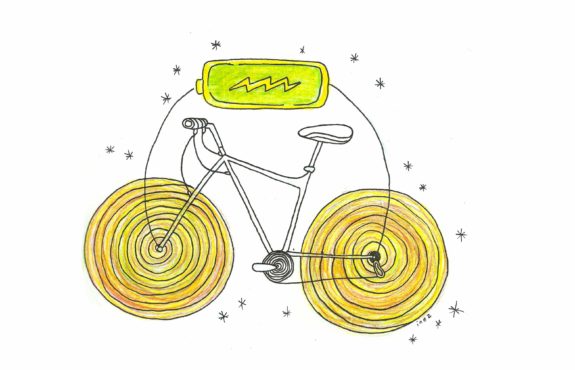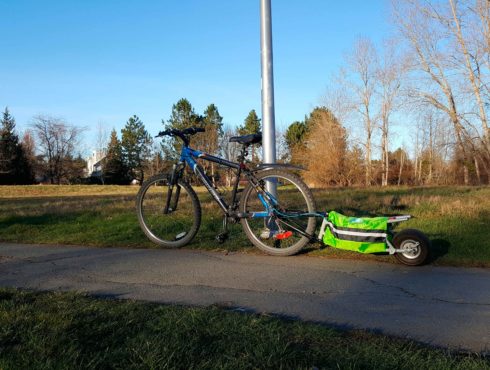UVic student king of the hills

By Nat Inez, Graphics Contributor
The burning sensation in your quads, the gasping for air, and the lactic acid building in your legs: three feelings that cyclists in Victoria undoubtedly face every day.
One of the drawbacks of living in Victoria — not that there are too many in our oasis by the sea — is the multitude of peaks, valleys, and hills this side of the Rocky Mountains. But UVic engineering and business student Simon Park saw the hills as a challenge begging for a solution. So, like most entrepreneurs and engineers when faced with a problem, he decided to come up with an answer.
Tired of dealing with the exhaustion he got from riding up hills and his lack of funds to buy an electric bike, Park designed plans for the “Caboost” — a small electrically charged trailer wheel that is attached to the back of a bike to give the rider a boost.
“Everything on the Caboost prototype is basically garbage”
“I wanted to get an electric bicycle basically,” says Park. “I thought a battery isn’t that expensive, a motor isn’t that expensive, so I looked online to see if there were any solutions out there and didn’t find anything. “So I thought I would just make one.”
Park credits the people of Victoria and the hidden gems found in trash cans for the building of the Caboost prototype.
“Everything on the Caboost prototype is made from basically garbage,” says Park. “It’s all stuff that I either pulled out of the garbage, stuff that people were throwing out, or there was a lot of stuff I got for free on UsedVictoria, stuff that people didn’t want anymore and they were just going to get rid of it.”
Once he compiled the mish-mash of unwanted parts, the garage of Park’s parents served as his laboratory to build the prototype.
“I basically made a huge mess in their garage right now,” says Park. “I had a bit of help from my dad, who’s an electrical engineer, and a bit of help from a guy at my church who’s a professional welder.”
After the Caboost was completed, Park submitted his invention to the Smart South Island Open Innovation Challenge, a competition organized by Victoria-based South Island Prosperity Project (SIPP).
An economic development company, SIPP’s goal is to create smart solutions for economic growth, and it holds several competitions to that end, including the Innovation Challenge.
Park’s Caboost was selected by SIPP out of 69 submissions from the public as one of 10 finalists for the $15 000 grand prize to help inventors with their projects.
After being named a finalist, the Caboost was judged in front of a live audience and experts who critiqued and assessed the project’s strategy, sustainability, accessibility and practicality.
Once the deliberations were concluded and the audience votes tabulated, Park’s invention was chosen as one of three winners — along with a food security technology project and an app to combat overdoses — for the grand prize.
Park sees the money from the competition as an opportunity to enhance the Caboost prototype to make it more functional and practical, and he plans to purchase the necessary equipment to sell the product in retail bike stores.
“With the winnings from the Open Innovation Challenge, it’s pretty exciting to move forward with the product design and development,” says Park. “It’s pretty challenging because this sort of stuff has really never been done before.

“The prototype is nothing really special, anyone could have made that,” he continues. “But it’s what I have in mind as far as actually designing it, making it look good, functional, and practical.”
For this fourth-year engineering student, this invention is a chance to test his classroom knowledge on an actual product.
“Doing the engineering analyses on it, that’s a lot of work, and it’s some stuff that I might know in theory, but I’ve never done this before because I’m just an undergraduate student,” Park explains.
Park has already received numerous phone calls asking when the Caboost will be available for sale; however, he reiterates that the product is still a prototype and not ready for the retail market.
So, in the meantime, the citizens of Victoria will have to rely on their own two feet to power up the daunting hills of Vancouver Island.
Files by Angel Manguerra
Thanks for reading! If you enjoyed this article and would like to make sure we keep writing articles like it, please consider supporting us on the Martlet 70 fundraiser’s GoFundMe page.
If you hated the article, though, you should still donate to the GoFundMe page (so we can hire better writers).








